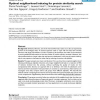Free Online Productivity Tools
i2Speak
i2Symbol
i2OCR
iTex2Img
iWeb2Print
iWeb2Shot
i2Type
iPdf2Split
iPdf2Merge
i2Bopomofo
i2Arabic
i2Style
i2Image
i2PDF
iLatex2Rtf
Sci2ools
109
click to vote
BMCBI
2008
2008
Optimal neighborhood indexing for protein similarity search
Background: Similarity inference, one of the main bioinformatics tasks, has to face an exponential growth of the biological data. A classical approach used to cope with this data flow involves heuristics with large seed indexes. In order to speed up this technique, the index can be enhanced by storing additional information to limit the number of random memory accesses. However, this improvement leads to a larger index that may become a bottleneck. In the case of protein similarity search, we propose to decrease the index size by reducing the amino acid alphabet. Results: The paper presents two main contributions. First, we show that an optimal neighborhood indexing combining an alphabet reduction and a longer neighborhood leads to a reduction of 35% of memory involved into the process, without sacrificing the quality of results nor the computational time. Second, our approach led us to develop a new kind of substitution score matrices and their associated e-value parameters. In contr...
Related Content
| Added | 09 Dec 2010 |
| Updated | 09 Dec 2010 |
| Type | Journal |
| Year | 2008 |
| Where | BMCBI |
| Authors | Pierre Peterlongo, Laurent Noé, Dominique Lavenier, Van Hoa Nguyen, Gregory Kucherov, Mathieu Giraud |
Comments (0)

